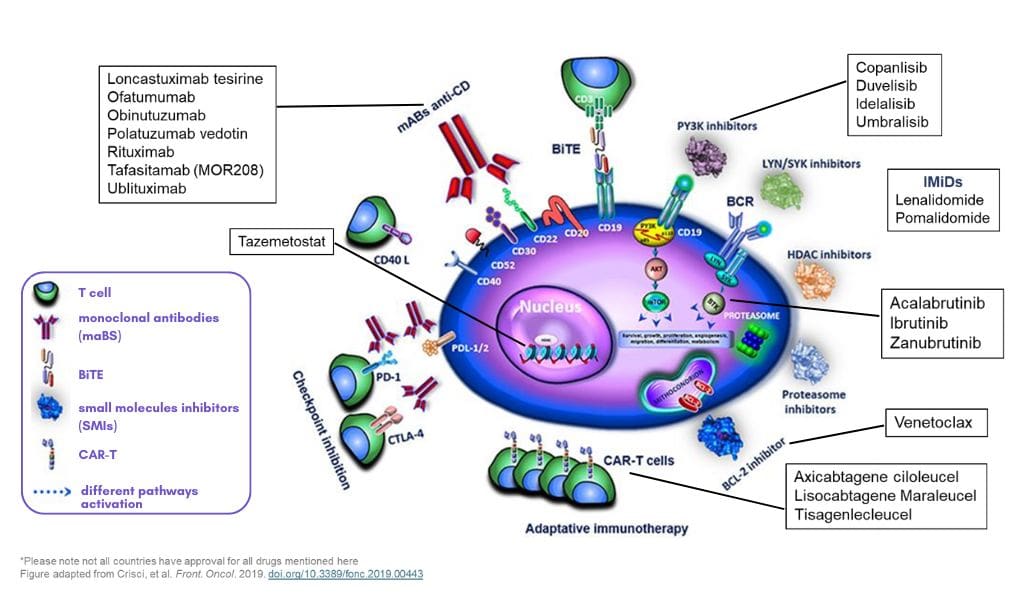Home » Your Support Hub » Understanding FL » Immunotherapy

Immunotherapy is a treatment technique that targets the immune system, making it work more effectively to fight disease – in this case, cancer. The most common immunotherapy drug used to treat follicular lymphoma is rituximab. Rituximab, and a related drug obinutuzumab, can be used as standalone medications, or in combination with other chemotherapy drugs.
In recent years, several new and promising immunotherapies have emerged for FL, especially for relapsed or refractory disease. These include CAR-T cell therapy and bispecific antibodies.
Rituximab is also referred to as a targeted therapy and belongs to a group of medications called monoclonal antibodies. These are man-made proteins that are designed to attack a specific part on the surface of the cancerous cells, in this case a protein called CD20, leading to their destruction.
Some people have an allergic-type reaction to rituximab, most commonly with the first infusion. This is not uncommon and can occur after any antibody-based drug. Reactions can be successfully controlled by reducing the rate or temporarily stopping the infusion and using antihistamines and sometimes steroid medications. Your nurses will monitor you very closely during your treatment and manage you if you have a reaction to rituximab, or whatever antibody you are receiving.
Chimeric Antigen Receptor T-cell (CAR-T) therapy is a cutting-edge treatment that involves reprogramming a patient’s own T-cells to recognize and attack lymphoma cells. This personalized therapy has shown promising results, particularly in patients with advanced FL that has not responded to other treatments. However, unfortunately, some people do not respond so well, with varying response and side effects.
Bispecific antibodies are a newer class of medicine designed to engage both cancer cells and immune cells simultaneously. These antibodies bind to a target on the lymphoma cells and a receptor on T-cells, enabling the immune system to better identify and destroy the cancer cells.
In some countries, CAR-T therapy and bispecific antibodies are currently approved for some forms of relapsed or refractory FL or can be accessed via clinical trials.
For more in depth information on newer immunotherapies visit Immunotherapy: Can we make better CAR-Ts and bispecific antibodies?
BTK Inhibitors: Bruton’s Tyrosine Kinase (BTK) inhibitors target a key enzyme involved in the growth and survival of lymphoma cells. By blocking BTK, these inhibitors can prevent the proliferation of cancerous cells. BTK inhibitors are being studied in FL and may offer another treatment option, especially for patients who are not responding to traditional therapies.
In some countries, BTK inhibitors in combination with obinutuzumab are currently approved for some forms of relapsed or refractory FL, or can be accessed via clinical trials
For a more scientific focus on these new therapies read Dr Mitchell Smith’s, FLF’s Chief medical Officer, Follicular Lymphoma: Mid-year Update on Pathways for Clinical and Translational Investigations
Below is a summary of selected treatment options in B-cell NHL and how they work:
This is a complicated diagram showing the multiple classes of agents with different ways of working that are available to treat FL, and within many classes there are multiple drugs. Often combinations of drugs from different classes are used together.
